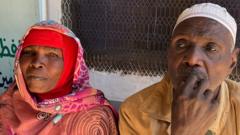In El Geneina, the capital of West Darfur, the remnants of a once-thriving community are now silent witnesses to a brutal conflict that has claimed countless lives. The ghostly outskirts of the city are lined with charred buildings and barren streets, stark reminders of the devastation that unfolded during two massacres last year, which left an estimated 15,000 people dead. Tom Fletcher, the new Under-Secretary-General for Humanitarian Affairs and Emergency Relief Coordinator, described the scene as "utterly chilling," emphasizing the severity of the humanitarian disaster in the region.
The violence, driven largely by the paramilitary Rapid Support Forces (RSF) and allied militias, has been characterized as ethnic cleansing, with particular targeting of the non-Arab Musalit community, amidst reports of widespread atrocities, including sexual violence and hunger crises unfolding concurrently. The Sudanese Armed Forces (SAF), also embroiled in allegations of war crimes, have contributed to the chaos, as civilians continue to bear the brunt of the warring factions' actions.
Forced displacement has become a tragic norm for many families, as seen in nearby refugee camps like those in Chad. The UN's efforts to provide assistance are hampered by bureaucratic hurdles and ongoing violence, further complicating the delivery of critical aid. The testimonies from newly displaced individuals reveal heartbreaking experiences of flight from violence, with both young and elderly members of families lost amid the chaos.
In receiving aid, displaced Sudaneses recount the trauma of separation and loss. A 14-year-old girl described how her family had to travel under the cover of darkness to evade detection by armed groups, while an elder voiced the anger and helplessness felt by survivors as they search for missing loved ones. Women, often left to care for children alone, implored the UN for basic necessities like food, water, and medical care, emphasizing their urgent plight.
During Fletcher's visit to a displacement camp, stories of struggle unfolded. The presence of armed groups has created an atmosphere of fear, limiting mobility and access to resources. A community elder shared their plea for help, emphasizing their neutrality in the conflict and stressing the dire need for humanitarian assistance across the fractured landscape.
As humanitarian organizations struggle to navigate a complex web of permissions and resources, the message from local NGOs is clear: more needs to be done. The dire reality of famine looms large, with some regions already facing declared food shortages while others are at serious risk. The UN's efforts to secure more access and assistance are ongoing, yet the overwhelming scale of suffering continues to warrant urgent international attention.
Fletcher's visit to Sudan has sparked cautious hope among affected populations and aid workers alike. The commitment to end impunity and indifference in a crisis marked by global neglect is a daunting challenge, but one that is increasingly necessary as the world turns its attention to other conflicts. The spotlight on Sudan must be maintained, as the hearts and stories of its people hang in the balance, waiting for a promise of relief and a path to recovery.




















